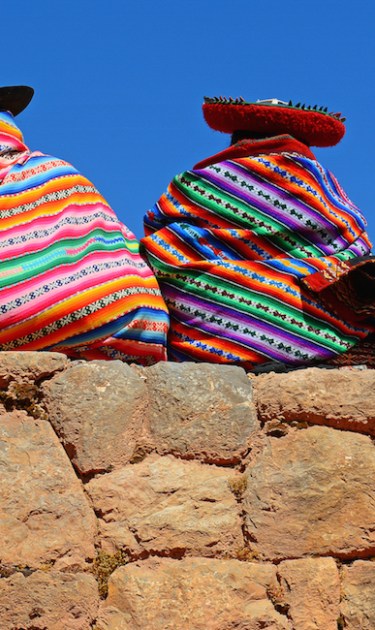For the first 14 years of her life, Elva Ambía was at her happiest, living in the highlands of Peru and immersed in the country’s Indigenous Quechua culture.
It was before her family’s move to Lima. One of eight siblings, her father’s health issues made it difficult for him to provide for them. So she did the only thing she could: Follow her older sister to America where they could earn more money to send back home.
“When I came to New York I cried every day for my family, for my country, for everything I had to leave behind,” Ambía tells me. “I didn’t want to leave Peru, but I felt obligated to come to save my family from poverty.”
That was 54 years ago. In the decades since coming to America, Ambía has dedicated her life to preserving and promoting the culture she left in Peru. In 2012, she co-founded the New York Quechua Initiative in the hopes of celebrating her Andean roots and preventing the extinction of her Indigenous language.

“Why should they have to forget the first language of [Peru]?”
Quechua has been spoken in Peru and other neighboring countries for more than 600 years. But centuries of colonization led to prejudice and discrimination toward Quechua speakers and the dominance of Spanish in schools and throughout the country. In Unesco’s 2017 map of “World Languages in Danger,” most of Peru’s Quechua dialects are listed as severely or critically endangered.
“In Peru, it seems like most schools want kids to abandon the Quechua language in favor of Spanish,” Ambía says. “It’s not right. Why should they have to forget the first language of this country? It’s only killing the language faster.”
So through her Quechua Initiative, Ambía organizes community gatherings and teaches classes in the language, bringing together those who always identified with their heritage and those who are connecting with it for the first time. Events typically include Quechua folk music and poetry or celebrate traditional holidays and include common Peruvian food and drink, such as locro de zapallo or chicha de jora.
This year, Ambía’s efforts to preserve the culture will be recognized at the fourth annual gathering of the Quechua Alliance in Philadelphia.
“I feel so honored but I’m shocked that anyone would be interested in recognizing my work,” Ambía says about the lifetime achievement award. “I just wanted to have a school where I could teach Quechua and pass it on. It was a big goal that I was able to reach and I’m just thankful for everyone that helped me along the way.”
“I just wanted to have a school where I could teach Quechua and pass it on.”
Founded by University of Pennsylvania Quechua professor Américo Mendoza-Mori, the alliance is a gathering open to anyone in the country to celebrate Quechua.
“This all started as a small gathering because we really didn’t know who would show up,” Mendoza-Mori tells me. “Suddenly, we had 30 to 40, now almost 100 people coming to the event. There are so many people who left their countries with the sense that this language was worthless, so to find a foreign university that’s celebrating it, recognizing its value and relevance — it’s really special.”
Gabriela Juarez, a UPenn senior and one of the alliance organizers, says the decision to honor Ambía at this year’s gathering stemmed from her contributions to preserving the language and fostering a community in New York where it could thrive.
“Creating a community is so important to keeping our culture and our language alive,” Juarez says. “The people who come to this event, who want to learn more about Quechua aren’t people who are going back to Peru, they’re people who are in the US, who want to incorporate their Indigenous culture and language into their identity as an immigrant. Initiatives like this go beyond just being Latinx, they help people explore the complexity of what that word means.”
When Ambía first came to New York, she found that even if she ran into someone who spoke Quechua, they weren’t teaching it to their children or they were forgetting it themselves in place of English and Spanish. But now, thanks to initiatives like hers and Mendoza-Mori’s happening across the country, Ambía says she’s finally beginning to see a change for the better.
“Over the past several years, I’ve noticed there are so many people opening themselves up to Quechua,” Ambía says. “Now I don’t feel so alone. I’m training the future teachers who will pass this on and making this journey with people who also believe in our language and our culture.”




